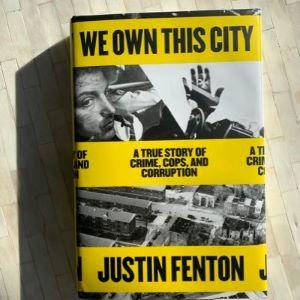We Own This City: A True Story of Crime, Cops, and Corruption by Justin Fenton (2021, Random House, 335 pp., $28.00 HB)

Such outrages inevitably -- and deservedly -- shock the conscience of the nation and garner lots of headlines. And they sometimes lead to reforms, with Taylor's death resulting in a Louisville ban on no-knock raids and a statewide partial ban on them, as well as propelling legislation both in other states and in Congress.
But most of the time, the drug war just grinds on, chewing up its victims and turning them into raw inputs for the criminal justice industrial complex, but also engendering both crime related to black market activities and deep mistrust if not outright loathing in the communities of color most ground down by the heavy hand of prohibition policing.
It also has a way of chewing through the integrity of too many cops. Corruption and drug law enforcement have gone hand in hand from the days of Harry Anslinger's crooked federal narcs all the way through the war on drugs. The litany of drug-related police corruption scandals is long and sordid, from Serpico's NYPD to the LAPD's Ramparts scandal, the Oakland Riders, Philadelphia's Tarnished Badge scandal and lesser, but equally corrupt groups of officers in places such as Miami, Memphis, Tulsa, and Baton Rouge.
And now we can add Baltimore's Gun Trace Task Force scandal. The name should ring a bell among regular readers of the Chronicle's This Week's Corrupt Cops Stories, where task force members made regular appearances among our listings of officers arrested, convicted, and sentenced for their criminal misdeeds in the past few years. But now, Baltimore Sun crime reporter Justin Fenton, who covered the whole thing as it unfolded, wraps it all up in an ugly little package in We Own This City, the title taken from the arrogant braggadocio of one of the miscreants.
In the 2010s, Baltimore was a city battered by decades of deindustrialization and declining population, hammered hard by heroin, and with surging crime and a murder count reaching record highs. Mayors came into office with new anti-crime plans and appointed new police chiefs with new strategies, but nothing was working. And then came the death of Freddy Gray, a 25-year-old Black man who died in the back of a police paddy wagon under suspicious circumstances.
As the city and the police department reeled in the face of furious outbreaks of rioting and mass protests, they turned to one of the department's stars, a self-promoting hot dog of a cop who managed to make more gun busts than anyone -- and made sure his supervisors knew it -- Sgt. Wayne Jenkins and his squad of elite plainclothes "jump out boys" in the Gun Trace Task Force.
But Jenkins and his boys were less about addressing the drugs and guns problem than exploiting it for their own ends. For years, the crew went on a rampage of unlawful traffic stops, break-ins, robberies, evidence-planting, and drug dealing as they preyed on the citizens of Baltimore -- mostly the Black citizens of Baltimore. They specialized in identifying and ripping off drug dealers and used their networks of informants to peddle the dope right back onto the same streets they took in from. Their false testimonies sent people to prison, and their reckless behavior led to the death of at least one innocent bystander.
That the Gun Trace Task Force got away with its out-of-control crime spree for years is an indictment not only of the amoral men involved, but also the public officials and police administrators who should have caught on but remained clueless until it all exploded in their faces thanks to a federal investigation that eventually cracked the case wide open. It's also a reminder that enforcing drug prohibition generates such scandals on a predictably regular basis.
Fenton does an admirable job of tying this multi-tentacled story into a neat, if disturbing little package. As a local crime reporter, he has the background and extensive contacts to provide a thorough understanding of city and state politics, the intricacies of the Baltimore Police Department, and the people of the city, both folks involved in the trade and just regular folks swept up in the task force crime wave. In so doing, he becomes the voice of the city, appalled and disgusted by the moral rot within the Gun Trace Task Force.
Drug war police corruption is an old story, but this time with a new locale and a new cast of characters, brought to life by a seasoned journalist. We Own This City is a gripping and disturbing read, carrying a lesson we still have not learned.
This work by StoptheDrugWar.org is licensed under Creative Commons Attribution-ShareAlike 4.0 International
Comments
corrupt cops
Cops are their own little self-serving tribe, anywhere ya go. And as a general rule, not to be trusted. Blacks have no special status in that regard. They gladly prey on all of us, to extort cash. "If you're not cop, you're little people." -- Soylent Green
"We Own This City" by Justin…
"We Own This City" by Justin Fenton is a gripping true story about crime and corruption in the Baltimore Police Department. It exposes systemic issues through the rise and fall of the Gun Trace Task Force, offering a powerful look at law enforcement failures.
For a fun break, try Papa's Games, a series of engaging restaurant simulation games. Manage eateries, serve delicious meals, and enjoy the challenge! Start playing now at Papa's Games.
4o
Add new comment